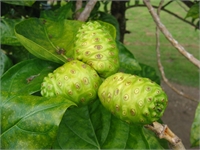
Health Benefits of Noni
Important Notice: Our web hosting provider recently started charging us for additional visits, which was unexpected. In response, we're seeking donations. Depending on the situation, we may explore different monetization options for our Community and Expert Contributors. It's crucial to provide more returns for their expertise and offer more Expert Validated Answers or AI Validated Answers. Learn more about our hosting issue here.

Health Benefits of Noni
You must be logged in to post a comment.
Overview
One of the most highly endorsed yet strongly criticized health supplements of recent decades, noni juice is nonetheless considered by many to be among the most powerful natural curatives nature provides.
Derived from the Morinda Citrifolia plant, a tall (up to 30 feet/9.14 meters), flowering evergreen indigenous to tropical climates, the juice is extracted from the rather unpleasant smelling potato-sized fruit the plant produces. While the bark, leaves, and seeds are used to make a number of valuable products including dyes and skin lotions, it is the fruit that is juiced and powdered, although many advocate eating the roasted seeds as well.
Native to many parts of the South Pacific, Australia, Southeast Asia, and India, with varieties also found in Florida, and, of course, Hawaii, noni has a long history of use in folk medicine, with many indigenous curatives derived from this plant.
Readily available in the US since the early 1990s in sweetened/unsweetened, pasteurized/unpasteurized, as well as ripened/unripened versions, noni imported (primarily) from Hawaii has spawned a lot of converts in recent years (especially among the New Age, health-conscious community), with many others citing quite unpleasant side-effects, or no discernable effects at all.
Reported Benefits
For the countless who have made noni a part of their daily health regimen, the reported health benefits are many:
> Immune System Booster
Despite having only about half the vitamin C of an orange, sodium levels considerably higher than an orange, and potassium levels high enough to warrant caution, noni is considered by many to be one of the most nutritious fruits on the planet due to high concentrations of phytochemicals and antioxidants, known to stimulate the immune system.
> Digestive Stimulant
Traditionally used as a laxative in the South Pacific, noni is said to effectively serve as a cleanser for the upper and lower intestines, thus making the digestive tract more receptive to nutrients. Note: Dieters find noni especially valuable as its active laxative properties aid in fast weight loss (for many) when consumed everyday.
> Analgesic
Commonly know as the “painkiller and headache tree,” noni is said to be 75% as effective as morphine sulphate in relieving pain–without the toxic side effects.
> Anti-inflammatory Against Fibromyalgia
Users who have compared noni juice to the newer, non-steroidal anti-inflammatory drugs (NSAIDs), report that it can be every bit as powerful in relieving fibromyalgia symptoms–at a fraction of the cost.
Research
> Much of the most conclusive research on noni juice is being conducted at the University of Hawaii, where researchers are studying the impact of noni on various forms of cancer. A large study involving 15,000 participants, conducted by Dr. Neil Solomon, involved noni taken over a seven month period, after which an impressive 75% of the participants reported noticeable improvements in their conditions, and of those individuals who did, 95% saw improvement within the first three months, following the study guidelines for taking Noni daily. Other related studies are looking into the use of noni to fight auto-immune diseases, effects of aging, diabetes, and other diseases.
> Biochemist and researcher, Dr. Ralph Heinicke, is studying an alkaloid called xeronine found in noni, which is also produced by the human body. Intended to allow the body to activate important enzymes that regulate and provide structure to proteins — a process the body cannot live without — the aim of his research is to show that noni aids in the process that begins cellular repair.
> Several studies have shown the presence of a number of active compounds like anthraquinones, scopoletin, and terpenes, which make noni effective against bacteria and fungus. Also, noni juice contains noni-ppt, shown to have anti-tumor/anti-cancer activity.
> At the 47th Annual Meeting of Society for Economic Botany, Folk Botanical Wisdom; Towards Global Markets, June 5-9, 2006, researchers discussed noni as a calming and relaxing agent potentially effective in blood pressure control, inhibition of COX-2 enzymes, lowering cholesterol levels, improving heart and cholesterol issues in smokers, improving athletes’ endurance and performance, and many other studies.
> At the IVth International Conference on Aromatic and Medicinal Plants from French Overseas Regions in Tahiti, July 10-13, 2006, the inhibitory effects of noni on phosphodiesterase enzymes suggest is may be a valuable tool for increasing energy and improving diabetic conditions.
Reported Side Effects
While considered safe for adults by the FDA, persons who initially take too high a dosage often suffer extreme intestinal distress or a laxative effect from noni. Other negative effects reported include digestive problems, severe intestinal distress, diarrhea, and bloating. Also, a small percentage of individuals have proven to be allergic to noni, developing coughing or breathing difficulties.
Perspective
Today, a considerable number of doctors are advocating noni to boost energy, treat high blood pressure and fluctuating blood sugar levels, act as a pain reliever and an anti-inflammatory drug, relieve arthritis symptoms and joint pain, and as a cancer treatment to improve and promote healthy cells in the human body.
A growing number of scientists believe that when taken as a nutritional supplement, noni can help fight a number of diseases while relieving swelling, backache, digestive problems, and limited joint flexibility. Noni creams have even been used to treat some skin problems on animals.
However, as with many natural products known to produce unpleasant side-effects in some, use with children should either be avoided or carefully monitored until additional research has been concluded.